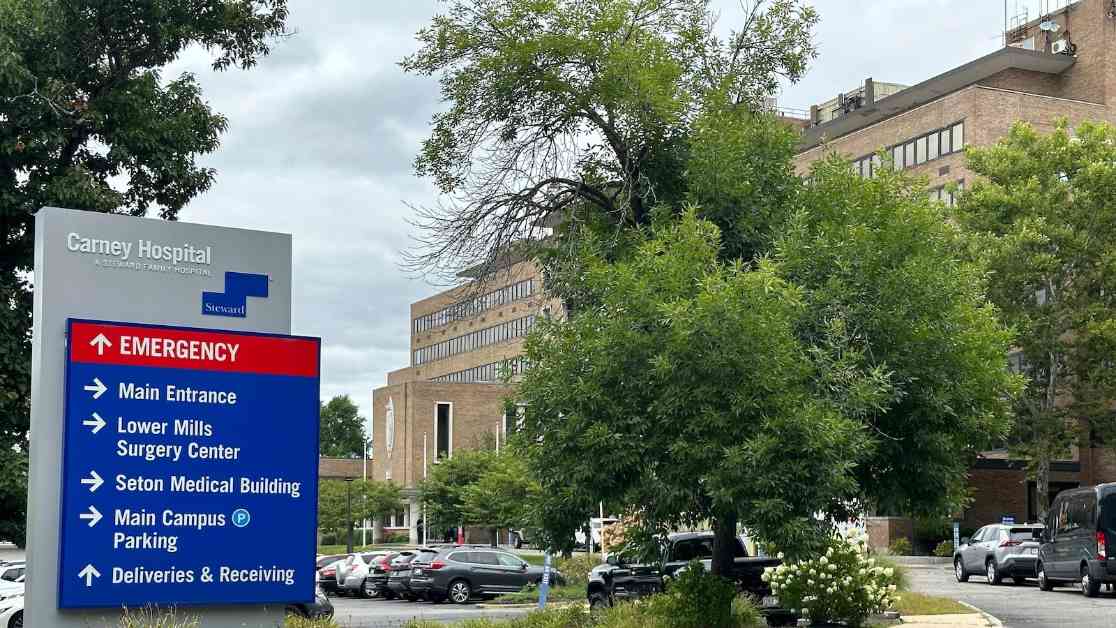Impact of Hospital Closures on Patient Care
The closure of Massachusetts hospitals by the bankrupt health care firm Steward Health Care has sent shockwaves through the healthcare community, leaving patients and staff in a state of uncertainty and distress. With Nashoba Valley Medical Center in Ayer and Carney Hospital in Boston shutting their doors, over 1,250 employees are facing job losses, and patients are left scrambling to find alternative care options.
For emergency physician Christina Hernon, the impending closure hits close to home. As a young child, she experienced a life-threatening medical emergency that was only resolved due to the prompt care she received at a local Massachusetts hospital. Now, as a healthcare provider herself, Hernon is deeply concerned about the impact the closures will have on patients in need of immediate medical attention.
The closure of these hospitals will not only result in job losses but will also severely limit access to critical healthcare services for residents in the affected areas. Patients who rely on these facilities for routine care, emergency services, and specialized treatments will now have to travel longer distances to receive medical attention, potentially putting their health and lives at risk.
Corporate Greed and Mismanagement
Behind the bankruptcy and subsequent closure of the Massachusetts hospitals lies a troubling tale of alleged corporate greed and mismanagement. Steward Health Care, the Dallas-based company that owns the hospitals, has come under fire for its financial practices, including allegations of prioritizing profits over patient care.
Former heart surgeon Ralph de la Torre, the founder and CEO of Steward Health Care, has been accused of extracting exorbitant sums of money from the company, amounting to over $100 million, before it filed for bankruptcy. Lawsuits and bankruptcy filings reveal a pattern of financial mismanagement, including the sale of all hospitals for $1.2 billion and leasing them back from new owners, a move that critics argue prioritized shareholder profits over patient well-being.
During the COVID-19 pandemic, Steward Health Care allegedly chose to prioritize payments to equity holders over maintaining critical hospital operations, leading to financial strain and ultimately the closure of the Massachusetts hospitals. A lawsuit filed by Aya Healthcare in Texas claims that Steward owes it $45 million for unpaid bills related to hospital nurses provided during the pandemic, further highlighting the company’s financial woes.
Human Cost of Corporate Failures
As the fallout from Steward Health Care’s bankruptcy continues to unfold, the human cost of corporate failures is becoming increasingly evident. Staff members at Nashoba Valley Medical Center and Carney Hospital are grappling with the devastating impact of losing their jobs and witnessing the closure of institutions that have served their communities for years.
For emergency room nurse Mary Ann Rockett, the closure of Carney Hospital represents a loss not only of a workplace but of a second home where staff and patients have formed close bonds. Rockett emphasizes the intimate knowledge that healthcare providers have of their patients’ medical histories and needs, underscoring the irreplaceable role that these hospitals play in their communities.
The closures of Nashoba Valley Medical Center and Carney Hospital are not just financial setbacks but represent a severe blow to the healthcare infrastructure in Massachusetts. The loss of these facilities will leave a significant gap in healthcare access for residents in Ayer and Boston, particularly those who are most vulnerable and in need of specialized medical services.
As the state and federal investigations into Steward Health Care’s bankruptcy and management practices continue, the focus remains on holding accountable those responsible for the collapse of the healthcare system in Massachusetts. The closure of the two hospitals serves as a stark reminder of the consequences of corporate greed and mismanagement in the healthcare industry, where profits are prioritized over patient care.
In the midst of this crisis, healthcare providers like Christina Hernon and Mary Ann Rockett continue to advocate for their patients and communities, calling for greater transparency and accountability in the healthcare system. As Massachusetts grapples with the aftermath of the hospital closures, the resilience and dedication of frontline healthcare workers stand as a beacon of hope in the face of adversity.
The closure of Nashoba Valley Medical Center and Carney Hospital is not just a financial loss but a human tragedy that will have far-reaching consequences for patients, staff, and communities in Massachusetts. As the healthcare industry grapples with the fallout from Steward Health Care’s bankruptcy, the urgent need for reform and oversight becomes increasingly clear. It is imperative that lessons are learned from this crisis to prevent similar failures in the future and ensure that patient care remains the top priority in the healthcare system.

















